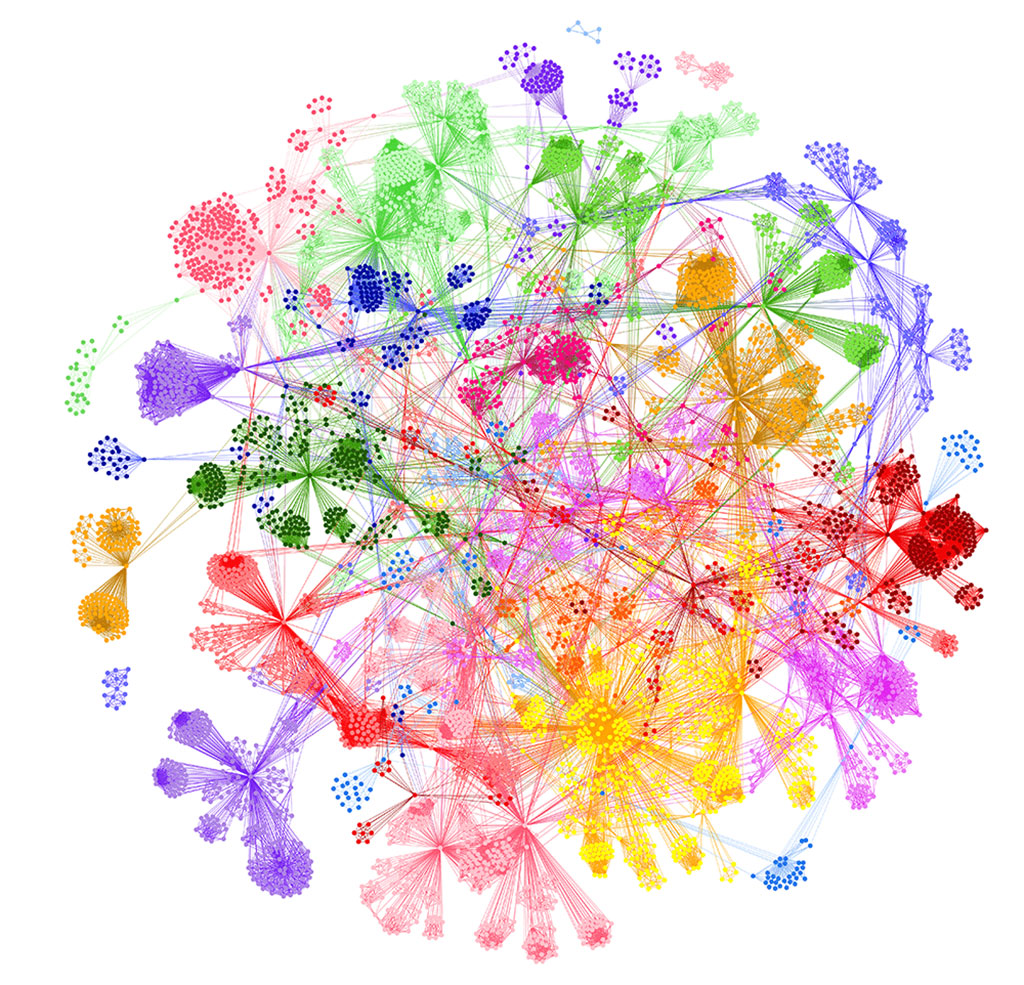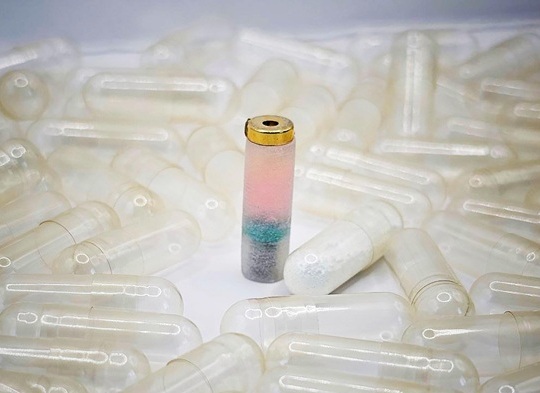AI Platform Identifies 68 Genes Associated with High Risk of Severe COVID-19
|
By HospiMedica International staff writers Posted on 02 Jul 2020 |

Image: Disease architecture of the severe COVID-19 patient population generated by the PrecisionLife platform. Each circle represents a disease-associated SNP genotype, edges represent co-association in patients, and colours represent distinct patient sub-populations (Photo courtesy of PrecisionLife Ltd.)
An artificial intelligence (AI) platform has found 68 genes associated with risk of developing severe COVID-19 after analysis of the genomes of 929 patients who had a severe response to SARS-CoV-2.
The unique AI platform developed by PrecisionLife Ltd. (Oxfordshire, UK) could help identify patients who are at greatest risk of developing the most severe forms of COVID-19, prior to an effective and widely available vaccine. Established Genome Wide Association Studies (GWAS) approaches have been limited by the heterogenous nature of COVID-19, making it difficult to clearly explain the wide range of symptoms and impacts of predisposing comorbidities associated with the disease. PrecisionLife has overcome this barrier by evaluating combinations of genetic features, which is not possible with existing GWAS approaches.
Using a combinatorial (high-order epistasis) analysis approach, PrecisionLife identified 68 protein-coding genes that were highly associated with severe COVID-19, nine of which have been previously linked to differential response to SARS-CoV-2. These 68 genes include several druggable protein targets and pathways, nine of which are targeted by drugs that have reached at least Phase I clinical trials.
“This is our second study specifically looking at host genomics to identify those most at risk and find opportunities to treat patients with later stage severe disease where host immune processes begin to run out of control” said Dr Steve Gardner, CEO of PrecisionLife. “We know that systemic remodelling, leaky vasculature and micro-clotting can cause severe issues in COVID-19 patients in lungs as well as other organs. We are encouraged that several of the genes identified relate to lipid programming, beta-catenin and protein kinase C signalling whose processes converge in a central pathway involved in plasma membrane repair, clotting and wound healing. This pathway is largely driven by calcium ion activation, which is a known serum biomarker associated with severe COVID-19 and ARDS. We intend to perform further analyses to investigate this hypothesis. We are also seeking to further validate 12 genes associated with dysfunctional immune response that are the first hint at a potential genetic signature for enhanced risk of flipping into a severe disease state.”
Related Links:
PrecisionLife Ltd.
The unique AI platform developed by PrecisionLife Ltd. (Oxfordshire, UK) could help identify patients who are at greatest risk of developing the most severe forms of COVID-19, prior to an effective and widely available vaccine. Established Genome Wide Association Studies (GWAS) approaches have been limited by the heterogenous nature of COVID-19, making it difficult to clearly explain the wide range of symptoms and impacts of predisposing comorbidities associated with the disease. PrecisionLife has overcome this barrier by evaluating combinations of genetic features, which is not possible with existing GWAS approaches.
Using a combinatorial (high-order epistasis) analysis approach, PrecisionLife identified 68 protein-coding genes that were highly associated with severe COVID-19, nine of which have been previously linked to differential response to SARS-CoV-2. These 68 genes include several druggable protein targets and pathways, nine of which are targeted by drugs that have reached at least Phase I clinical trials.
“This is our second study specifically looking at host genomics to identify those most at risk and find opportunities to treat patients with later stage severe disease where host immune processes begin to run out of control” said Dr Steve Gardner, CEO of PrecisionLife. “We know that systemic remodelling, leaky vasculature and micro-clotting can cause severe issues in COVID-19 patients in lungs as well as other organs. We are encouraged that several of the genes identified relate to lipid programming, beta-catenin and protein kinase C signalling whose processes converge in a central pathway involved in plasma membrane repair, clotting and wound healing. This pathway is largely driven by calcium ion activation, which is a known serum biomarker associated with severe COVID-19 and ARDS. We intend to perform further analyses to investigate this hypothesis. We are also seeking to further validate 12 genes associated with dysfunctional immune response that are the first hint at a potential genetic signature for enhanced risk of flipping into a severe disease state.”
Related Links:
PrecisionLife Ltd.
Latest COVID-19 News
- Low-Cost System Detects SARS-CoV-2 Virus in Hospital Air Using High-Tech Bubbles
- World's First Inhalable COVID-19 Vaccine Approved in China
- COVID-19 Vaccine Patch Fights SARS-CoV-2 Variants Better than Needles
- Blood Viscosity Testing Can Predict Risk of Death in Hospitalized COVID-19 Patients
- ‘Covid Computer’ Uses AI to Detect COVID-19 from Chest CT Scans
- MRI Lung-Imaging Technique Shows Cause of Long-COVID Symptoms
- Chest CT Scans of COVID-19 Patients Could Help Distinguish Between SARS-CoV-2 Variants
- Specialized MRI Detects Lung Abnormalities in Non-Hospitalized Long COVID Patients
- AI Algorithm Identifies Hospitalized Patients at Highest Risk of Dying From COVID-19
- Sweat Sensor Detects Key Biomarkers That Provide Early Warning of COVID-19 and Flu
- Study Assesses Impact of COVID-19 on Ventilation/Perfusion Scintigraphy
- CT Imaging Study Finds Vaccination Reduces Risk of COVID-19 Associated Pulmonary Embolism
- Third Day in Hospital a ‘Tipping Point’ in Severity of COVID-19 Pneumonia
- Longer Interval Between COVID-19 Vaccines Generates Up to Nine Times as Many Antibodies
- AI Model for Monitoring COVID-19 Predicts Mortality Within First 30 Days of Admission
- AI Predicts COVID Prognosis at Near-Expert Level Based Off CT Scans
Channels
Critical Care
view channel
AI Heart Attack Risk Assessment Tool Outperforms Existing Methods
For decades, doctors have relied on standardized scoring systems to assess patients with the most common type of heart attack—non-ST-elevation acute coronary syndrome (NSTE-ACS). The GRACE score, used... Read more
'Universal' Kidney to Match Any Blood Type
Blood-type incompatibility has long been one of the greatest obstacles in organ transplantation, forcing thousands of patients—particularly those with type O blood—to wait years longer for compatible donors.... Read moreSurgical Techniques
view channel
Minimally Invasive Endoscopic Surgery Improves Severe Stroke Outcomes
Intracerebral hemorrhage, a type of stroke caused by bleeding deep within the brain, remains one of the most challenging neurological emergencies to treat. Accounting for about 15% of all strokes, it carries... Read more
Novel Glue Prevents Complications After Breast Cancer Surgery
Seroma and prolonged lymphorrhea are among the most common complications following axillary lymphadenectomy in breast cancer patients. These postoperative issues can delay recovery and postpone the start... Read morePatient Care
view channel
Revolutionary Automatic IV-Line Flushing Device to Enhance Infusion Care
More than 80% of in-hospital patients receive intravenous (IV) therapy. Every dose of IV medicine delivered in a small volume (<250 mL) infusion bag should be followed by subsequent flushing to ensure... Read more
VR Training Tool Combats Contamination of Portable Medical Equipment
Healthcare-associated infections (HAIs) impact one in every 31 patients, cause nearly 100,000 deaths each year, and cost USD 28.4 billion in direct medical expenses. Notably, up to 75% of these infections... Read more
Portable Biosensor Platform to Reduce Hospital-Acquired Infections
Approximately 4 million patients in the European Union acquire healthcare-associated infections (HAIs) or nosocomial infections each year, with around 37,000 deaths directly resulting from these infections,... Read moreFirst-Of-Its-Kind Portable Germicidal Light Technology Disinfects High-Touch Clinical Surfaces in Seconds
Reducing healthcare-acquired infections (HAIs) remains a pressing issue within global healthcare systems. In the United States alone, 1.7 million patients contract HAIs annually, leading to approximately... Read moreHealth IT
view channel
Printable Molecule-Selective Nanoparticles Enable Mass Production of Wearable Biosensors
The future of medicine is likely to focus on the personalization of healthcare—understanding exactly what an individual requires and delivering the appropriate combination of nutrients, metabolites, and... Read moreBusiness
view channel
Philips and Masimo Partner to Advance Patient Monitoring Measurement Technologies
Royal Philips (Amsterdam, Netherlands) and Masimo (Irvine, California, USA) have renewed their multi-year strategic collaboration, combining Philips’ expertise in patient monitoring with Masimo’s noninvasive... Read more
B. Braun Acquires Digital Microsurgery Company True Digital Surgery
The high-end microsurgery market in neurosurgery, spine, and ENT is undergoing a significant transformation. Traditional analog microscopes are giving way to digital exoscopes, which provide improved visualization,... Read more
CMEF 2025 to Promote Holistic and High-Quality Development of Medical and Health Industry
The 92nd China International Medical Equipment Fair (CMEF 2025) Autumn Exhibition is scheduled to be held from September 26 to 29 at the China Import and Export Fair Complex (Canton Fair Complex) in Guangzhou.... Read more

















